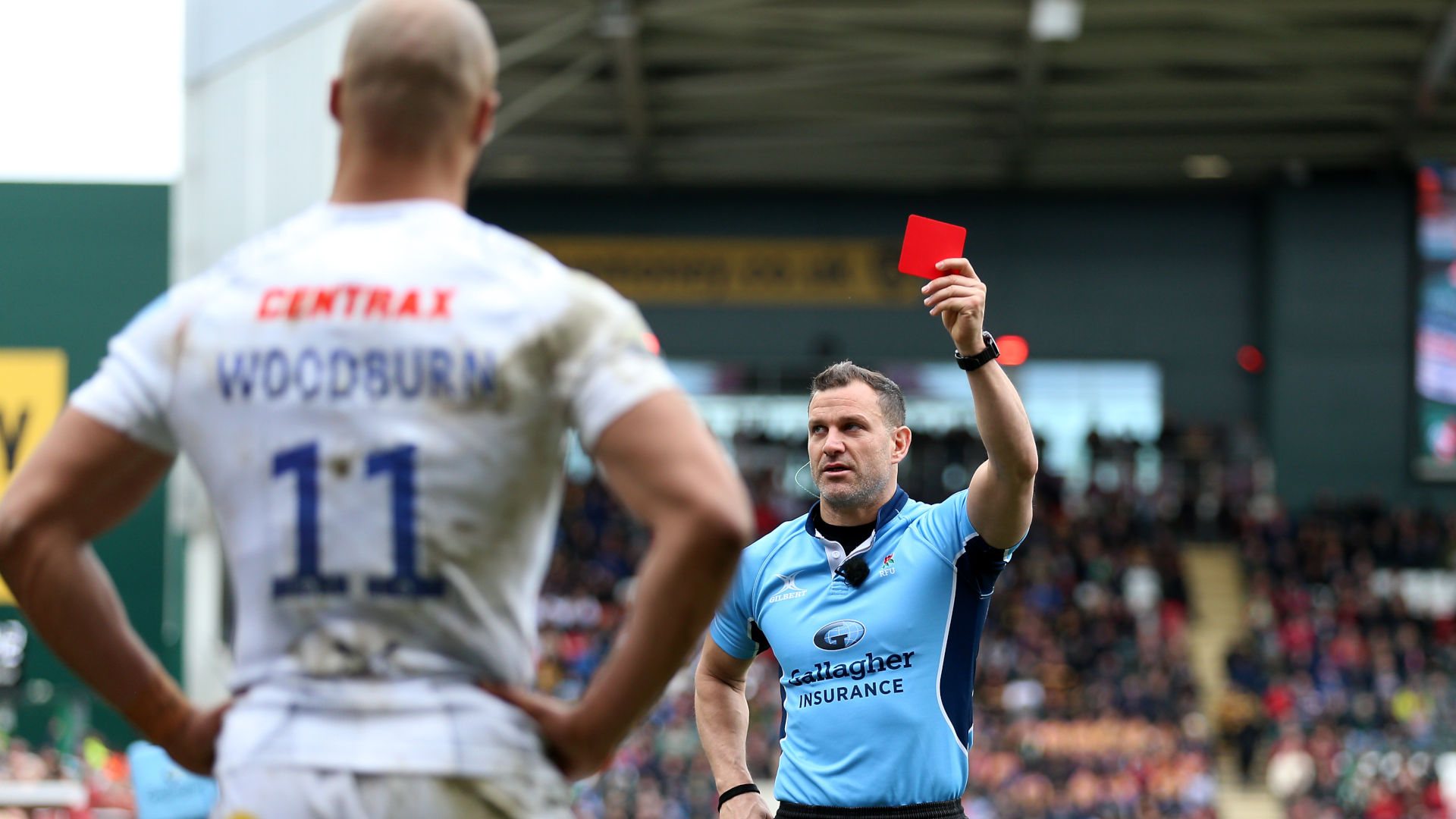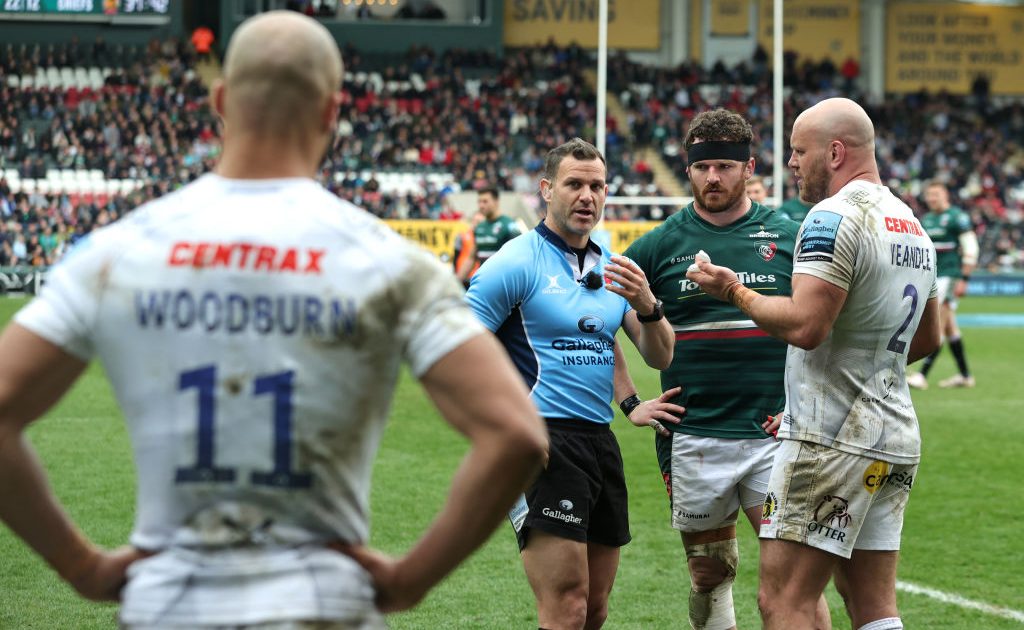Ref Watch: The truth about the Olly Woodburn call

Ed Morrison is to date the only Englishman among the elite eight-strong list* of World Cup final referees.
And it was the Bristolian who took charge of South Africa’s emotion-charged 1995 extra-time win over New Zealand that came to mind as I considered the reaction of many ex-players and Exeter winger Jack Nowell to the red card that Karl Dickson last weekend showed to Olly Woodburn.
Morrison did most of his top-level refereeing in the last decade of the amateur era when he numbered some outstanding officials including his countryman Tony Spreadbury, Scotland’s Jim Fleming, Wales’ Derek Bevan and Aussie Wayne Erickson among his contemporaries. When finding my way with the whistle I was recommended a referee coaching book which Morrison co-produced with a fellow Bristol Society member who also happened to be a writer.
The book tells the tale of an international involving Australia who had a prop leave the field to have a cut stitched. In those days replacements were strictly only for injuries, temporary or blood substitutes didn’t exist and there were no safety-based regulations dictating that only fully-trained props pack down in the front row unless scrums go uncontested.
The game continued until Morrison blew for a knock-on at which point the Wallabies looked hopefully to the sidelines – where there was still no sign of a patched-up prop.
After a pregnant pause the English whistler took charge. “You need to prop,” he told startled openside flanker David Wilson.
And before anyone had time to make further comment he turned to his opponent in the front row and told him “If you don’t go easy on him I’ll penalise you.”
Olly Woodburn gets a 2nd yellow and is sent off on a ? for… well, take a look:
? @btsportrugby | #LEIvEXE pic.twitter.com/gTmOs7a8gU
— RugbyPass (@RugbyPass) April 16, 2023
The opponent nodded, Wilson duly packed down against him and the match continued without any further ado.
As this story shows, in times past referees were encouraged to use the laws as a framework within which they managed 30 players to produce the best possible match for players, officials and spectators.
By contrast, the modern quest for total consistency means Dickson and his contemporaries are required to follow a pre-determined mental checklist which dictates exactly how every situation is dealt with – and not just when considering contact to the head.

The introduction of the TMO has made this situation worse rather than better. Because every significant incident is reviewed behind the scenes then replayed frame by frame to the onfield officials, crowd and players on a giant screen as required, referees must have a standard sanitised pre-approved response to avoid accusations of inconsistency.
It is no longer acceptable to referee the big picture and by managing it well and with empathy for what the players are trying to achieve reach an outcome in real time with which most people are broadly happy. Instead, the official must attempt the impossible and try to deal with every detail. Any other approach sadly now risks ordeal by cherry-picked TV clips at the hands of the half-time analysts or after the event from angry fans or coaches on social media.
This unenviable position was precisely where Dickson found himself last weekend, when he followed a process which was then repeated in the subsequent disciplinary ruling – which incidentally quite rightly applied no further sanctions to Woodburn – and spelled out a sequence of law which caused a second yellow card to be followed by a red.
Had Dickson not been required to look at a TMO slo-mo the game would have continued with a lineout and no-one would have said any more about it. But once it became apparent frame-by-frame that Ashton had a knee on the ground thus making the tackle complete, and that Woodburn then arrived off his feet and from the side and by doing so prevented a probable try being scored, there was only one possible outcome regardless of whether you view the Exeter winger as also being guilty of diving on a prone player (which I don’t).
Following the hammering that Dickson took on social media, there was surely no coincidence about the timing of him being awarded one of the upcoming four Champions Cup semi-finals on the same day that this disciplinary verdict was delivered. While supporting your officials is the right thing to do – especially when they are in the right – effectively placing him alongside Wayne Barnes, Jaco Peyper and Mathieu Reynal ahead of English colleagues Matthew Carley and Luke Pearce in my view gets the pecking order wrong, but that one is for another day.
The TMO was of course introduced in rugby, cricket and now football with the prime objective of removing the ‘howler.’ Going back to the Morrison era for an example, the David Campese try which was so crucial to a test match between the Wallabies and the Lions is the type of episode which its use has successfully eradicated.
But everything evolves, and it seems to me that rugby now needs to find a way to row back on its more widespread use since it is killing so much of what we all love about the sport. The question is how to put toothpaste back in the tube?
I remember refereeing a good friend after he ended his top-level playing days at Coventry, Leicester and Rugby Lions and was occasionally turning out for a local Warwickshire level six club.
He found the transition to playing with lower-skilled players a difficult one, and after one match suggested to me that it would have been a much better game had I ignored the countless small knock-ons and only blown the big ones. He was undoubtedly correct, but then I asked him how he would have responded had the opposition scored a match-winning try after I ignored an earlier knock-on. His theory was rapidly returned to the drawing board!
This is the issue that rugby now has, since allowing the referee to manage the big picture Ed Morrison style and only use the TMO to correct a howler is simply not a viable approach when we can all pause our TV and watch again in slo-mo. The half-time analysts would simply reel off a string of items which – to the letter of the law – were incorrectly not penalised and confusion would reign.
Instead, it seems that rugby is going the other way. I was recently privileged to attend a presentation given by Premier League football referee John Brooks who with the use of loads of video footage spoke brilliantly and provided an enthralling insight into his job.
I was amazed by the level of post-match scrutiny given to games he refereed and (and this truly left me staggered) to those which he sat in a TV studio in London and watched as the main VAR official.
Frame by frame hundreds of decisions and non-decisions per match are dissected and itemised with a mark being given for how accurately he called each situation. Those with higher marks over the season end up with the bigger games. Where football leads rugby union inevitably follows…
I always enjoy hearing from Exeter’s Rob Baxter as like my old Wasps boss Dai Young he appears to have a considered opinion which is worth listening to on most subjects. Of course, he would have played in ‘the Morrison era’ and his post-match calls for common sense to be applied to this Woodburn incident reflect this. As per my friend and the small knock-ons, would he have taken the same approach had the decision in question seen Exeter benefit from a Leicester player being red carded? Let’s hope so.
Another seemingly likeable character, Jack Nowell, has been handed a whopping £10,000 fine for his less considered, spur-of-the-moment Twitter reaction. Quite clearly this is based not just on him being wrong in law but also on how he should behave as a role model in a sport which seeks to recruit and support officials rather than criticise/abuse and lose them.
The irony of this situation is that a rugby player who is very much ‘of the moment’ in both look and approach has taken a 2020’s approach by firing out a comment on social media to his 61700 followers in which he effectively calls for the referee to ignore the letter of the law and apply common sense in the old style…. he’ll have 1990’s hair before we know it!
· For those who like a quiz question:
1987 – Kerry Fitzgerald (Aus), 1991 – Derek Bevan (Wal), 1995 – Ed Morrison (Eng), 1999 – Andre Watson (SA), 2003 – Andre Watson (SA), 2007 – Allain Rolland (Ire), 2011 – Craig Joubert (SA), 2015 – Nigel Owens (Wal), 2019 – Jerome Garces (Fra)





































































The point is, if he followed the rule of law he missed 2-3 other occasions in they match for the same offense. The stupidity of the law is that players often dive on a player to get under the ball and stop grounding, and never punished. In fact, we praise such play, it's a skill.
The inconsistency of the rule applied is what causes the frustration, together with the lack of thought of the rule itself.
The ref himself is very inconsistent. He's not a top quality ref yet, but he's still pretty young in his career. If he follows the law here and he's not followed the law in 2-3 other situations, because they were not try scoring situations, which by the letter of law doesn't matter.